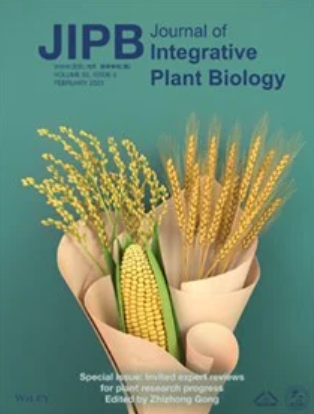Two-faced OsNAS3 influences disease resistance via nicotianamine and ethylene
IF 9.3
1区 生物学
Q1 BIOCHEMISTRY & MOLECULAR BIOLOGY
引用次数: 0
Abstract
The loss and gain of OsNAS3 function both positively influence plant disease resistance. Overexpression of OsNAS3 boosts blast resistance by promoting nicotianamine accumulation, thereby enhancing blast resistance. Conversely, knockout of OsNAS3 increases ethylene biosynthesis, also contributing to improved blast resistance.

双面 OsNAS3 通过烟碱和乙烯影响抗病性。
OsNAS3 功能的缺失和增益都会对植物的抗病性产生积极影响。OsNAS3 的过表达可促进烟碱胺的积累,从而增强抗病性。相反,敲除 OsNAS3 会增加乙烯的生物合成,也有助于提高抗病性。
本文章由计算机程序翻译,如有差异,请以英文原文为准。
求助全文
约1分钟内获得全文
求助全文
来源期刊

Journal of Integrative Plant Biology
生物-生化与分子生物学
CiteScore
18.00
自引率
5.30%
发文量
220
审稿时长
3 months
期刊介绍:
Journal of Integrative Plant Biology is a leading academic journal reporting on the latest discoveries in plant biology.Enjoy the latest news and developments in the field, understand new and improved methods and research tools, and explore basic biological questions through reproducible experimental design, using genetic, biochemical, cell and molecular biological methods, and statistical analyses.
 求助内容:
求助内容: 应助结果提醒方式:
应助结果提醒方式:


